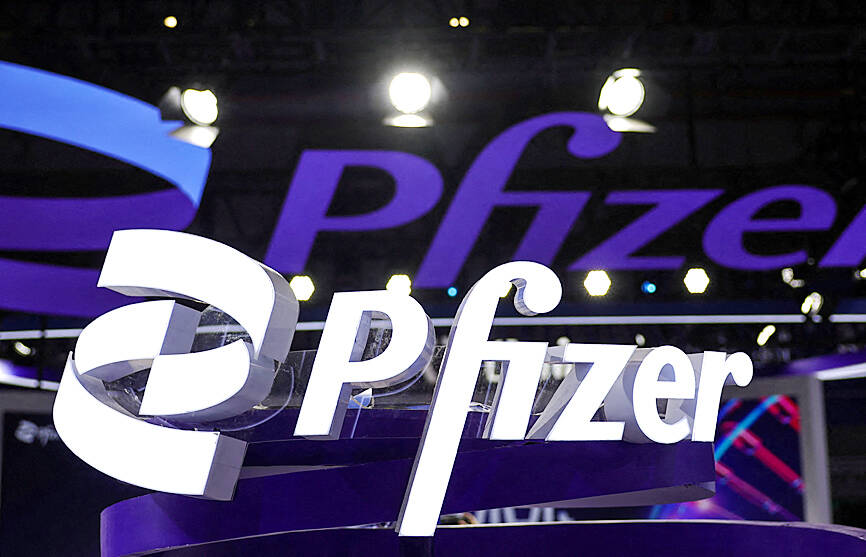US pharmaceutical giant Pfizer Inc signed a deal to purchase development-stage obesity drugmaker Metsera Inc, winning a bidding war against Novo Nordisk A/S, the Danish drugmaker behind weight-loss treatments Ozempic and Wegovy.
Metsera, based in New York, has no products on the market, but it is developing oral and injectable treatments. That includes potential treatments that could target lucrative fields for obesity and diabetes.
The deal comes as Pfizer is attempting to develop its own stake in that market, several months after ending development of a potential pill treatment for obesity.

Photo: REUTERS
In a statement issued on Friday, Metsera said Pfizer would acquire the company for up to US$86.25 per share, consisting of US$65.60 per share in cash and a contingent value right entitling holders to additional payments of up to US$20.65 per share in cash.
Metsera cited US antitrust risks in Novo’s bid, saying in its statement that the board has determined Pfizer’s revised terms represent “the best transaction for shareholders, both from the perspective of value and certainty of closing.”
The deal comes three days after Novo Nordisk raised the stakes in its push to outbid Pfizer, on Tuesday saying it would offer to pay as much as US$10 billion for Metsera. That was higher than its previous bid of up to US$9 billion, which sparked a lawsuit from Pfizer.
Pfizer had altered the offer it made in September of nearly US$4.9 billion to provide more cash up front, Metsera had said.
New York-based Pfizer said in an E-mail that it was happy with the terms of the deal, and expects to close the transaction shortly following the Metsera shareholder meeting on Thursday.
Novo Nordisk on Saturday said it would not increase its offer and would leave the race to acquire Metsera.

PERSISTENT RUMORS: Nvidia’s CEO said the firm is not in talks to sell AI chips to China, but he would welcome a change in US policy barring the activity Nvidia Corp CEO Jensen Huang (黃仁勳) said his company is not in discussions to sell its Blackwell artificial intelligence (AI) chips to Chinese firms, waving off speculation it is trying to engineer a return to the world’s largest semiconductor market. Huang, who arrived in Taiwan yesterday ahead of meetings with longtime partner Taiwan Semiconductor Manufacturing Co (TSMC, 台積電), took the opportunity to clarify recent comments about the US-China AI race. The Nvidia head caused a stir in an interview this week with the Financial Times, in which he was quoted as saying “China will win” the AI race. Huang yesterday said

Nissan Motor Co has agreed to sell its global headquarters in Yokohama for ¥97 billion (US$630 million) to a group sponsored by Taiwanese autoparts maker Minth Group (敏實集團), as the struggling automaker seeks to shore up its financial position. The acquisition is led by a special purchase company managed by KJR Management Ltd, a Japanese real-estate unit of private equity giant KKR & Co, people familiar with the matter said. KJR said it would act as asset manager together with Mizuho Real Estate Management Co. Nissan is undergoing a broad cost-cutting campaign by eliminating jobs and shuttering plants as it grapples

The Chinese government has issued guidance requiring new data center projects that have received any state funds to only use domestically made artificial intelligence (AI) chips, two sources familiar with the matter told Reuters. In recent weeks, Chinese regulatory authorities have ordered such data centers that are less than 30 percent complete to remove all installed foreign chips, or cancel plans to purchase them, while projects in a more advanced stage would be decided on a case-by-case basis, the sources said. The move could represent one of China’s most aggressive steps yet to eliminate foreign technology from its critical infrastructure amid a

MORE WEIGHT: The national weighting was raised in one index while holding steady in two others, while several companies rose or fell in prominence MSCI Inc, a global index provider, has raised Taiwan’s weighting in one of its major indices and left the country’s weighting unchanged in two other indices after a regular index review. In a statement released on Thursday, MSCI said it has upgraded Taiwan’s weighting in the MSCI All-Country World Index by 0.02 percentage points to 2.25 percent, while maintaining the weighting in the MSCI Emerging Markets Index, the most closely watched by foreign institutional investors, at 20.46 percent. Additionally, the index provider has left Taiwan’s weighting in the MSCI All-Country Asia ex-Japan Index unchanged at 23.15 percent. The latest index adjustments are to